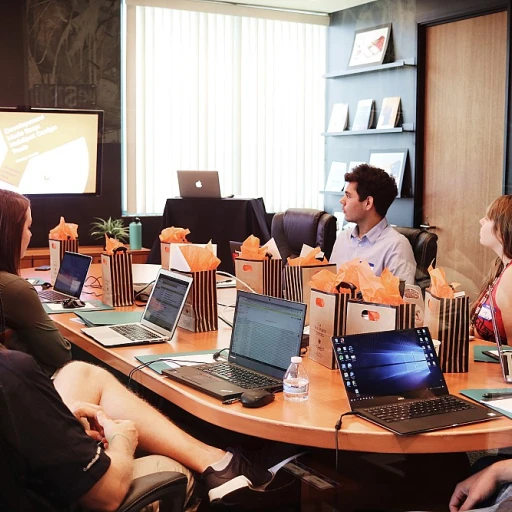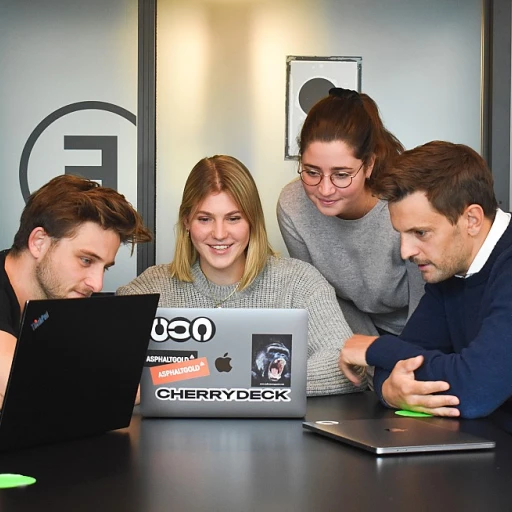Analyzing Common Pitfalls in Work Tech Products
Unveiling Common Challenges in Work Tech Endeavors
In the rapidly evolving world of work tech, understanding the factors influencing success and failure is crucial for stakeholders committed to launching a viable product. A thorough feasibility study often highlights potential pitfalls, helping to steer the development process toward success. However, several common challenges repeatedly emerge, which, if not managed meticulously, can lead to financial distress for a project.
Among the predominant issues is the lack of comprehensive market research. Skipping or inadequately performing market analysis inevitably undermines the product's grounding. This can lead to a mismatch between product offerings and the actual needs of the target audience. Studies suggest that a significant gap in understanding your market can be detrimental to the product's chances in the highly competitive landscape.
Economic feasibility is another area often underestimated by many innovators. A robust financial feasibility assessment should account for all potential costs, revenues, and economic challenges that may arise throughout the product's lifecycle. Overlooking these critical elements can derail even the most promising projects, resulting in a substantial failure investment.
Technical requirements pose another challenge. A detailed technical feasibility study can reveal whether the proposed product service can be developed within the technical constraints and is capable of meeting industry standards. Many products have stumbled due to unsatisfactory technical assessments, leading to the inability to deliver what was promised or meet customer expectations.
Lastly, proper consideration of legal factors is indispensable for commercial feasibility. Not being compliant with industry codes or regulations can result in costly legal battles or fines. Aspiring entrepreneurs should navigate these waters carefully, ensuring all aspects are vetted by a legal team to mitigate these risks.
Understanding these common pitfalls provides a foundation for exploring the role of market research in subsequent phases and learning from notable failures to enhance future product development strategies. For those navigating this complex terrain, ensuring personal data safeguards in accordance with privacy regulations is equally important. Explore strategies to effectively manage this through privacy management in the AI era.
The Role of Market Research in Product Development
Importance of Comprehensive Market Research in Tech Product Success
In the intricate journey of product development, market research stands as a functional cornerstone. Understanding the market landscape is essential for assessing the feasibility of any tech project. Through detailed market analysis, businesses can discern both the financial feasibility and commercial viability of their products. Here are some of the reasons why market research plays such a critical role:- Identifying Market Needs: Market research helps in recognizing unmet needs and demands. This knowledge aids in shaping a business plan that caters to actual customer requirements, thus avoiding product-service mismatches.
- Understanding Competition: Project developers can assess competitive positioning through comprehensive studies. Knowing where competitors stand can guide strategic decision making and influence product adjustments for economic feasibility.
- Evaluating Financial Potential: With a sound feasibility analysis, businesses can predict potential financial outcomes, minimizing failure investment risks. Financial feasibility assessments are crucial in understanding budget allocations and resource expenditure from raw materials to technical requirements.
- Analyzing Technical Requirements: Product development is not just about the idea. An in-depth understanding of technical feasibility ensures that infrastructure and operational prerequisites are met, potentially safeguarding the project from technical hurdles.
Case Studies of Notable Work Tech Failures
Examples of Poor Market Analysis
When examining the commercial viability of work tech products, there are several notable cases where inadequate market analysis has led to failure. These examples highlight the importance of conducting thorough feasibility studies before launching a product.Unmet Market Needs
One common pitfall has been the misalignment between product offerings and actual market demands. In instances where companies skipped comprehensive assessment of market feasibility, their products often failed due to the lack of interest from potential users. These projects underestimated critical factors influencing success, such as understanding the technical and financial requirements that align with market expectations.Underestimating Competition
Several work tech products misfired in their market entry because of insufficient analysis of their competitive landscape. By not accounting for the presence of strong competitors in their market feasibility studies, these businesses found themselves unable to secure a foothold. This often led to the misallocation of resources and eventual withdrawal from the market.Financial Overreach
Another concern has been the poor financial feasibility planning that resulted in overinvestment without securing necessary market traction. Companies that invested heavily, without a robust economic feasibility and strategic business plan, often faced significant financial setbacks. These failures underscore the need for careful investment project planning.Misguided Product Development
In some cases, product development was not backed by sufficient market research, overlooking essential user needs and preferences. This resulted in poor decision-making processes where the end product did not match what the market desired. Addressing technical feasibility and refining the product service model according to market analysis can greatly enhance success potential. Further understanding of these dynamics, such as through enhancing customer relationships with Sensei CRM, can help align product development with market needs and improve commercial feasibility.Lessons Learned from Failed Work Tech Products
Lessons Derived from Past Mishaps
Understanding the reasons behind the failure of work tech products can offer invaluable insights into developing commercially viable solutions. Historically, several factors have contributed to the downfall of such products. A comprehensive analysis reveals that significant missteps often centered on market assessment, technical feasibility, and financial analysis. One lesson derived from these failures is the critical importance of conducting thorough feasibility studies. Some projects did not adequately assess market demand, leading to products that lacked relevance to users. It's vital for companies to conduct detailed market analyses to understand user needs and preferences, thereby enhancing product feasibility and aligning with business goals. A prominent factor is the neglect of technical requirements, which can significantly impact product development. Projects that failed to address technical feasibility encountered setbacks during the development process, resulting in untenable products that could not be sustained in the market. Financial feasibility also plays a crucial role. Many investment projects underestimated the financial commitment required, leading to funding shortfalls. This underlines the necessity for comprehensive financial planning and investment analysis, ensuring projects are adequately financed and poised for success. In terms of business strategy, the integration of continuous assessment and adaptation processes is key. Companies should remain alert to changes in the market environment, adjusting their strategies and ensuring their offerings remain relevant and economically viable. By learning from these failures, businesses can make informed decisions that bolster the likelihood of product success, ensuring they address both the demand and technical complexities of their respective markets.Strategies for Improving Commercial Feasibility
Strategies to Enhance Commercial Viability in Work Tech
Commercial feasibility is a critical aspect of bringing any work tech product to market. A multitude of factors needs careful consideration throughout the development process to ensure success. Reflecting on the lessons learned from other product failures can be instrumental in informing future projects. Businesses can take a systematic approach to enhance the feasibility of their tech products. A solid business plan that comprehensively addresses technical feasibility, market feasibility, and financial feasibility is paramount. Here are some strategic steps to help improve commercial viability:- Conduct Thorough Feasibility Studies: Understanding the market is key. Extensive market analysis should be performed to identify potential customers, assess the demand for the product, evaluate competitors, and understand market trends.
- Evaluate Financial Feasibility: It's vital to conduct financial feasibility that considers cost implications, potential investment needs, and the expected return on investment. Ensuring that the project aligns with financial goals can dictate the project's success.
- Focus on Technical Requirements: Ensure that any technical challenges are addressed early in the product development stage. Factors such as the availability of raw materials, technical feasibility, and the legal landscape should be part of the assessment.
- Invest in Market Research: Regularly updating market studies can offer insights and allow businesses to pivot when necessary. This can mitigate risks and increase the likelihood of a successful market entry.
- Engage in Continuous Product Development: Adaptation is essential. Continuous development and improvement of the product or service based on user feedback can maintain relevance and enhance commercial feasibility.
Future Trends and Their Impact on Work Tech Products
Emerging Trends in Work Tech
The landscape of work tech is continuously evolving, influenced by several emerging trends. These trends are reshaping how businesses approach product development and market feasibility. As we look ahead, it's crucial to understand these dynamics to improve commercial feasibility and decision making.
AI and Automation
Artificial intelligence and automation are becoming integral to work tech products. The integration of AI can enhance technical feasibility by streamlining processes and reducing the need for manual intervention. However, this also raises the bar for technical requirements, demanding more sophisticated product development efforts.
Remote Work and Collaboration Tools
The shift towards remote work has accelerated the demand for effective collaboration tools. This trend impacts market feasibility, as businesses seek solutions that facilitate seamless communication and project management across distributed teams. Products that fail to address these needs may struggle with commercial viability.
Sustainability and Ethical Considerations
There is a growing emphasis on sustainability and ethical business practices. Companies are increasingly conducting feasibility studies that include environmental and social factors. Products that align with these values can gain a competitive edge in the market, influencing both financial and market feasibility.
Data Security and Privacy
With the rise of digital solutions, data security and privacy have become paramount. Products must meet stringent legal and technical requirements to ensure compliance and build trust with users. A thorough feasibility analysis should consider these aspects to avoid potential legal pitfalls.
Personalization and User Experience
Personalization is a key factor influencing user adoption and satisfaction. Work tech products that offer tailored experiences can enhance user engagement and drive business success. This requires a careful assessment of user needs during the product development process.
Conclusion
Understanding these future trends is essential for improving the commercial feasibility of work tech products. By incorporating these insights into feasibility studies and market analysis, businesses can better navigate the complexities of product development and achieve greater success.












